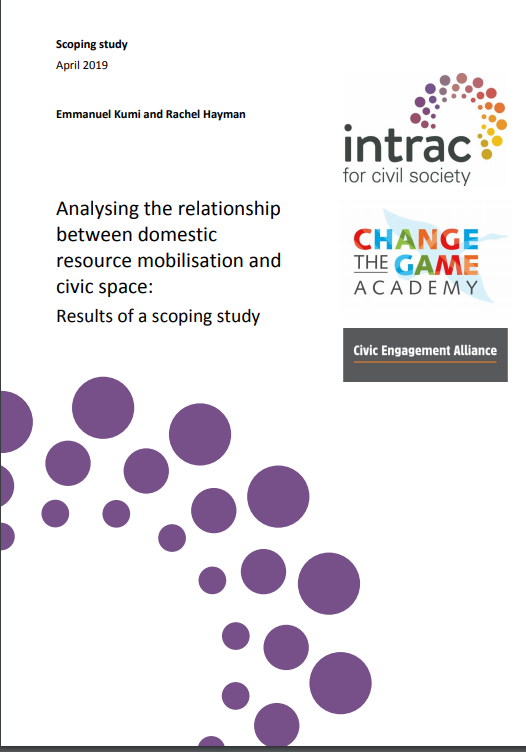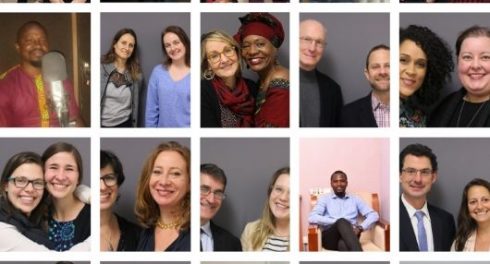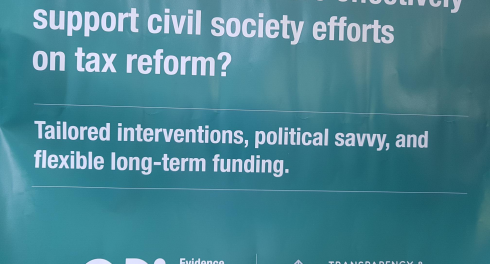Highlights:
- Avoiding lender remorse
- Fight for your (virtual) rights
- Navigating the blame game
- Local money for local problems
- Shop till you drop
- Storytime for policymakers
- Check your bias
- TAI spotlight: Global fiscal sponsorship and quantified society
In case you missed it…
Avoiding lender remorse

Photo: Alex Kondratiev on Unsplash
Ongoing IMF debt negotiations with the Republic of Congo have a hit a snag over opaque debt deals with China and oil traders. A leaked letter from advisers to the government warned of a major risk of rejection by the IMF’s board without more serious progress bringing China and others to table for more transparent debt restructuring.
The Congolese government may want to take a look at the Institute for International Finance’s Principles for Debt Transparency, due to be adopted by G20 finance ministers and central bank governors this month. But, as the Center for Global Development’s Mark Plant points out, these non-binding principles are only a start and will be meaningless without concerted action on the part of financial institutions to make them a reality.
Meanwhile, in Nigeria, questions remain over the extent to which President Buhari’s newly installed second administration will use its mandate to double down on transparency commitments. A $750 million World Bank program on “States Fiscal Transparency, Accountability and Sustainability” covering 36 states should motivate some engagement. This push for more transparent state budgets is intended to help improve public service delivery. If implemented, the public should get access to annual spending plans for almost half of the country’s budget. Those involved might want to read Gavin Hayman’s reflections on four years of pushing open contracting implementation, not least “transparency is a great place to start but it’s the wrong place to stop.” For Open Contracting Partnership, the push to go from transparency to transformation means more focus on connecting policy to power – working more with frontline agencies on services they are trying to deliver and working back to fixes in contracting to get there. No reason not to go one step further back to budget allocation fixes, too.
Staying in Nigeria, a recent study from Staffordshire University showed the power of social media as a tool to monitor infrastructure projects, but only if budgets are made transparent – they cite research from Uganda showing corrupt government officials were less able to siphon money for their own enrichment when citizens knew where money was supposed to go and could, therefore, monitor spending; the diversion of funds fell by 12% over six years.
Fight for your (virtual) rights
With RightsCon bringing together human rights and data activists in Tunis this week, its a timely moment for the Human Rights Measurement Initiative to release their new data portal measuring human rights across a number of dimensions by country.
Expect much talk in Tunis of the failings of big tech to adequately protect user rights. As rumblings grow in Washington (and beyond) about anti-trust inquiries, open data practitioners are using this moment as an opportunity for a deeper conversation about the role of the private sector in data privacy and protection. Experts from the Information Technology & Innovation foundation argue for creating a system of “data free flow with trust.” Others might warn however against governments (and their private vendors) going too far in collection and analysis of its citizens’ personal data. The Bureau of Investigative Journalism looked into just this issue in the UK and found little transparency as to what the British government’s data management programs looks like and, more importantly, how the private sector is being contracted (with taxpayer money) to support them.
For their part, what can donors do to ensure responsible data use? Linda Raftree and Syez Raza have some thoughts, identifying three key principles for donor organizations to adopt. (You can always find more in the recently-published State of Open Data).
In all this data talk, we should not ignore the gender dimension. A new report from Equal Measures 2030 finds that not one of the 129 countries analyzed is on track to meet the gender equality SDGs by 2030. To close this gap, they call for more public finance for gender data – perhaps a new $300m equality fund from the Canadian government can help. That was by far the largest of several funding commitments made at the WomenDeliver conference last week – follow the fascinating conversations there via #WD2019.
Navigating the blame game
Protections for women activists was one crucial thread of conversation at WomenDeliver against the backdrop of continued restrictions on civic space. New laws in Togo further restrict freedom of peaceful assembly, while violence against peaceful protestors ramps up in Sudan, as the death toll rises to 100. The government tightening its grip on journalists and social media with new bills in Nepal. Finally, attacks and threats on human rights activists during protests in Indonesia.
How can the international community persist despite all this? Thomas Carothers and Saskia Brechenmacher, of the Carnegie Endowment for International Peace, argue that funders are struggling with four unresolved questions – Are we dealing with closing or changing civic space? Do we tackle roots causes or symptoms? How to align efforts at local and global levels? And are we doing enough to ensure we aren’t exacerbating problems (e.g. through foreign funding association or constraining funding models)? These largely resonate with conversations within TAI.
Meanwhile, in Liberia, we’re seeing evidence for how regional actors can play a role in preventing violations of civic space among their members. In the run-up to mass protests on June 7, the Economic Community of West African States (ECOWAS) dispatched a couple dozen observers to monitor the protests and the government’s response.
For a sense of the importance of different perspectives in our storytelling, we are excited to track the voices to appear on the From Poverty to Power blog – Maria Faciolince gives us a sense of what to expect.
Local money for local problems
Could domestic revenue mobilization (DRM) help open up civic space? The NGO INTRAC thinks possibly so, and has undertaken a new research effort with the Civic Engagement Alliance to examine how DRM and local fundraising could expand the space for CSOs. Their research found that DRM does indeed increase CSOs local legitimacy and improve relations with the state but can have unintended negative effects such as mission drift and co-optation.

DRM is also the name of the game these days for governments, and one avenue for DRM are so-called “sin taxes” on things like alcohol, tobacco, and gambling. The evidence suggests these taxes can both raise revenue and improve health outcomes, but as former Colombian Ministry of Health official Pamela Gongora-Salazar describes, it can be a challenge to overcome the vested corporate interests against such taxes.
In Latin America, such efforts can prove particularly challenging. A recent conference at Rice University’s Baker Institute for Public Policy explored the recent major corruption scandals in the region and other issues of corruption control in Latin America. The conference organizers compiled a series of interviews with the leading experts in attendance, providing a great compendium on addressing corruption in Latin America. Good fodder for conversations at the OAS General Assembly in Medellin later this month where anti-corruption will be a major theme.
Shop till you drop
British authorities are on a mission to clean up their country’s image as a haven for “dirty money” with a focus on “unexplained wealth orders,” a legal tool used to require “politically exposed persons” to provide a detailed account of how they obtained a piece of real estate or a good. The latest target was the wife of an Azerbaijani banker who spent £30,000 on chocolate and £150,000 on perfume at Harrods, a posh London department store.
Meanwhile, stateside, Clay Fuller of the American Enterprise Institute is calling for the U.S. government to establish a beneficial ownership registry in the name of national security. He argues lax LLC laws have allowed a toxic system to flourish, financing everything from terrorism, drug smuggling, and foreign autocracies.
Essential listening
Nanjala Nyabola, a Kenyan activist, political analyst, and author speaks about her new book: Digital Democracy, Analogue Politics: How the Internet Era is Transforming Politics in Kenya. She discusses how the digital age and social media has impacted Kenyan politics and what it means for democracies, both in Africa and elsewhere.

Storytime for policymakers
Perhaps one way to achieve policy change is to heed the advice of the George Washington University’s Elizabeth Grant. She discusses the importance of data-based storytelling to achieving policy change, urging researchers to combine their empirical evidence with stories about ideas and how the world works. Vibeke Wang and Ragnhild Louise Muriaas, researchers at the Chr. Michelsen Institute, discuss how translating their complex research into film forced them to craft a story around their data and cut down their information to the bare minimum needed to tell the story. And if we want to tell compelling stories, we first need to listen to the stories others tell us. Sarah Cotton Nelson emphasizes the importance of listening in philanthropy and having the humility to let our own ideas take a backseat to those of others.
Check your bias
Are standards of professionalism really a mask for racial bias? Aysa Gray, Fellowship Director at the Center for Ethnic, Racial, and Religious Understanding at Queens College makes the case that commonly-accepted standards of professionalism more often than not privilege the values of white and Western employees and leave behind people of color – a challenge for funders and grantees alike.
One way to ensure greater diversity of ideas is ensuring your organization prioritizes collaboration (one value we hope of collaborative platforms like TAI). The University of Central Florida’s Stephen Fiore highlights a deficiency in today’s workplace of collaborative problem-solving skills and argues for better integration of teamwork and collaboration into the classroom to aid the next workforce generation.
Finally, everyone struggles with optimizing monitoring and evaluation, so we’re glad to flag a new resource that might help. INTRAC’s new M&E Universe is designed for development practitioners to learn about new methods and tools for their evaluations. Check it out.
TAI spotlight
Going global: how about fiscal sponsorship outside the United States? | TAI
We share what we’ve learned (so far) from incomplete investigations into fiscal sponsorship mechanisms outside the U.S. and speculate on their potential and drawbacks.
New website | Open Society Foundations
OSF has launched a new website designed for accessibility, transparency, and storytelling – check if it delivers on its objectives.
Life in a quantified society | Open Society Foundations
OSF discusses our “quantified society” where data collection is everywhere and algorithms dominate, highlighting how this affects real peoples’ lives and challenges open society.
Tips on winning 100&Change | MacArthur Foundation
Got your game-changing idea? How do you sell it? Past finalists of the MacArthur Foundation’s 100&Change competition provide tips to prospective applicants.
Calls: Proposals, papers, speakers and course invites
- Call for Applications: Africa Debt Crisis Analysis: June 14
- Hewlett Foundation’s Call for proposals: African policy research institutions to advance government use of evidence – June 15
- IDS Perceptions Survey: June 16
- Call for Proposals: Research on Impact and Effectiveness of Open Government program – July 8
- Call for Applications: 100&Change: July 16
- OECD Questionnaire for Youth Organisations – June 21
- Request for Proposals: Women’s Political Participation in Hybrid Regimes: August 9
On the calendar
- RightsCon Tunis – June 11-14, 2019 (Tunis, Tunisia)
- InterAction Forum 2019 – June 11-13, 2019 (Washington, DC)
- Global Conference on Transparency Research – June 26 – 27, 2019 (Rio de Janeiro, Brazil)
- Tax Justice Network Conference 2019 – July 2 -3, 2019 (City, University of London, UK)
- ATI/ITC Tax and Development Conference 2019 – July 2 -4, 2019 (Berlin, Germany)
- IDEAS 2019 Global Assembly and Third International Conference on Evaluating Environment and Development – September 30 – October 4, 2019 (Prague, Czech Republic)
- Global Symposium (COPGS) on Citizenship, Governance, and Accountability in Health – October 15-18, 2019 (New Delhi, India)
- What Works Global Summit 2019: Building Evidence – October 16 – 18, 2019 (Mexico City, Mexico)
- Global Perspectives 2019 – October 29 – November 1, 2019 (Addis Ababa, Ethiopia)
- The Story Conference – November 27-29, 2019 (Melbourne, Australia)


